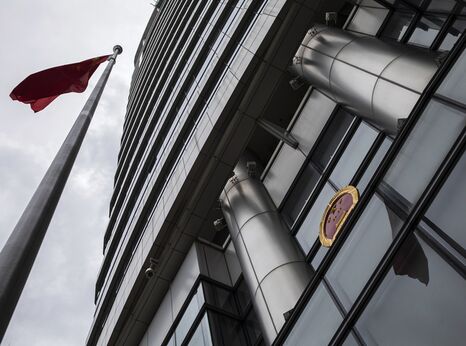10 Hongkongers charged, no access to own lawyers

CHENG Tsz-ho (鄭子豪), CHEUNG Chun-fu (張俊富), LIU Tsz-man (廖子文), QUINN Moon (喬映瑜), TANG Kai-yin (鄧棨然), LI Tsz-yin (李子賢), LI Yu-hin (李宇軒), WONG Wai-yin (黃偉然) and four other individuals were intercepted by coast guard officers from mainland China after leaving Hong Kong on a speedboat on 23 August 2020.
On 16 December, two among the 12 were formally charged for “organizing other persons to secretly cross the border” (组织他人偷越国(边)境), facing up to 10 years’ imprisonment, while eight others face up to one year imprisonment for “secretly crossing the border” (偷越国(边)境). The Shenzhen Yantian District Procuratorate will also hold a closed-door hearing to decide whether to charge the remaining two detained individuals, who were both under 18 when arrested, while they remain in custodial detention.
Before being arrested and detained in mainland China for “secretly crossing the border”, 11 of the 12 individuals were arrested in Hong Kong for a range of alleged offences, including conspiring to wound with intent, rioting, assaulting a police officer, conspiring to commit arson, possessing a substance with intent to destroy or damage property, making an explosive substance, committing arson with intent and conspiring to commit arson with intent.
According to the information disclosed by some family members in a press conference held on 12 December 2020, the Chinese public security officers asked many questions about the protests in Hong Kong in 2019 when interrogating the 12, even though they were charged with offences related to border-crossing. The Chinese authorities have no jurisdiction to investigate cases in which the 12 are involved in Hong Kong.
In the same press conference, the families reiterated their calls, requesting that the detained individuals be represented by family-appointed lawyers instead of government-appointed lawyers. The family members also urged the Chinese authorities to allow the 12 to directly communicate with family and the lawyers they appointed. They also demanded the authorities to inform family members of the date(s) of the trials and ensure that they can attend these trials. In China, it is not uncommon for family members of detained dissidents to be prevented from attending trials. Some of them are only informed of the trial, and sometimes even the verdicts, well after the fact.
Amnesty International has documented numerous cases in which detained individuals in mainland China, many of them human rights defenders, have been routinely deprived of their right to see lawyers that they or their families have chosen to represent them. In some instances, the authorities have appointed lawyers for detainees without their consent or consent of the family. In other cases, the authorities threatened lawyers to drop cases, claimed that detainees dismissed family-hired lawyers without producing any proof or stopped families from hiring lawyers – all of which effectively amounts to depriving the detainees’ of their right to legal representation. Individuals deprived of legal representation of their own choice are often denied access to information about their legal rights, making them more vulnerable to unfair legal procedures.
One of the 12 detainees, LI Yu-hin, reportedly left Hong Kong to seek asylum after he was arrested for “possessing ammunition without a license” and “colluding with foreign or external elements to endanger national security”. LI is among the 35 activists and protesters arrested for violating the Hong Kong national security law so far since its enactment on 30 June 2020. The United Nations human rights office and expert bodies have repeatedly expressed concerns about the national security law, stating the broadly worded legislation can lead to “discriminatory or arbitrary interpretation and enforcement which could undermine human rights protection”.